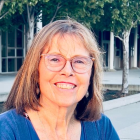Support strong Canadian climate journalism for 2025
These in-their-own-words pieces are told to Patricia Lane and co-edited with input from the interviewee for the purpose of brevity.
Yusra Shafi is a 22-year-old immigrant from Kuwait. With KAIROS Canada, she is supporting women in Colombia, the Democratic Republic of the Congo (DRC), Israel/Palestine, and South Sudan. She works to empower women to sustainably manage natural resources, build climate-resilient communities and participate in negotiations and decision-making that contribute to lasting and equitable peace with environmental justice.
Tell us about your work.
Droughts displace women who feed their families from small-holding farms. Extreme heat makes it unsafe for children to walk to school. Pollution makes drinking water scarce and creates hazards for children playing outside. Shortages cause conflict and when violence breaks out, women and children are in harm's way. Yet, too often, they have very little voice in the decisions which created the crises or fail to ameliorate them. KAIROS is a collective voice for 10 Canadian churches and church organizations working to improve human rights and social and environmental justice. The Women of Courage: Women, Peace and Security program partners with local women-led organizations in places impacted by militarized conflict to increase the leadership and voice of women in addressing the intersecting impacts of conflict, gender-based violence and climate change.
Recently, we have been amplifying and celebrating some of our partner organizations' amazing work. KAIROS brought representatives from all four countries to Canada to meet each other and Indigenous communities and impress upon members of Parliament how seriously they regard the multiple crises they face, which are multiplied by the changing climate.
It is my job to act as a recorder of these events, so we can all celebrate and learn.
I was sponsored to attend COP27 by KAIROS and For the Love of Creation and attended COP28 with the support of KAIROS and the Mary Ward Foundation. At COP27, many civil society delegates took advantage of the Kairos Blanket Exercise, an experiential learning opportunity to gain a felt understanding of colonialism. We also met with Canadian elected officials and negotiators. But the main benefit of the COP process is the opportunity to listen to others, especially from the Global South and marginalized communities like youth who are disproportionately affected and working on climate solutions. Some people are disillusioned about these conferences, but they do have good impacts. The Loss and Damage Fund would not be on the table but for the advocacy of the Global South at these conferences. I believe as long as we keep meeting, there is still hope.
How did you get involved with KAIROS?
I came to Canada four years ago to study and was placed with KAIROS for an internship. I felt inspired by the work of this community of people of faith working across cultures and borders to support those who do not have enough voice. When this opening came up, I had finished my degree and jumped at the opportunity.

Tell us about your background.
My parents understood that I would benefit from understanding the world as a place of diversity and many nations, so they enrolled me in an international school. My friends from all over the world taught me about the impacts of climate change on their homes and families. It was a natural next step to want to study environment and psychology in a multicultural centre like Toronto.
What makes your work at KAIROS hard?
Many people in Canada do not see climate change as a threat because it is not apparent to them in their own places. It is a challenge to connect the impact of floods in the Congo or drought in South Sudan with things that matter to a city dweller in Canada.
What gives you hope?
It can be hard as a young person to feel hopeful because we have a strong sense that time is running out. But my work allows me to see ripple effects from even small interventions. One day, a woman is empowered to talk to her neighbour. The next day, she is talking to the United Nations Security Council. First, someone gets excited about making bricks from waste. Then it spreads, and soon multiple communities are doing it.
What would you like to say to other young people?
You are needed at the table. If enough of us claim that right, we can win.
What about older readers?
I was at a recent conference, the Parliament of the World's Religions, and an older man said to me: “Older people have the resources and the money. Young people have the ideas and the urge for action. This combination is what will bring change.”







Comments